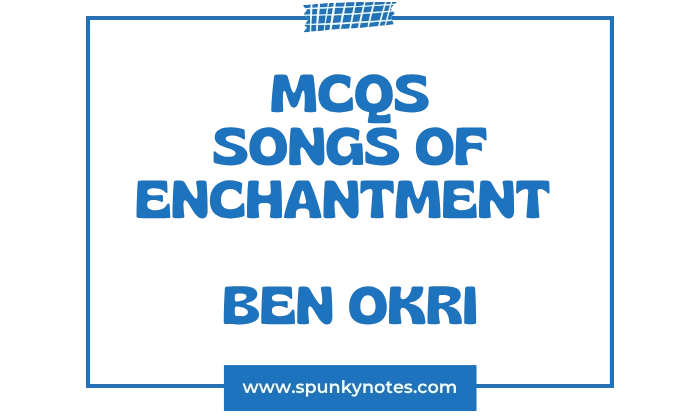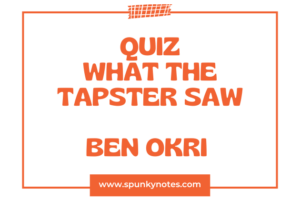

Estimated Reading Time: 18 min
Songs of Enchantment MCQs
1. What are the seven mountains always ahead of the characters, calling them to realize?
A. Wealth and fame
B. Dreams, joys, and promises
C. Political victory
D. A new homeland
2. What did the characters fail to see, leading to being unprepared for the ensuing chaos?
A. The approaching army
B. The circulating spirits
C. The mountains ahead
D. The closure of the betting shop
3. What is the nature of the narrator, the spirit-child, described as being?
A. A willing seeker
B. A professional spy
C. An unwilling adventurer
D. A cheerful observer
4. What event caused the narrator’s adventures to get deeper and stranger?
A. Mum leaving home
B. Dad’s last fight
C. The coming of the Masquerade
D. Meeting Helen
5. What unexpected content filled the narrator’s history exercise book at school?
A. Love poems
B. Complex math equations
C. Philosophical riddles
D. Foreign language
6. Who stared at the narrator from the trunk of a dying silk-cotton tree during mathematics class?
A. The face of a penitent oppressor
B. The face of Pharaoh Akhnaton
C. The faces of the unborn
D. All of the above
7. How did the spirit-companions torment the narrator during English class?
A. Whispering secrets
B. Singing polyphonic chorales in seven languages
C. Making him invisible
D. Making him fail the exam
8. Why did teachers often fail the narrator despite accurate answers?
A. They disliked his family
B. They thought he had been cheating
C. They didn’t understand his spirit nature
D. He refused to pay attention
9. What arcane knowledge did the spirit-companions instill in the narrator before he could read?
A. Colonial history
B. Quantum physics and chiaroscuro
C. Zulu mathematics
D. Political philosophy
10. What prophecy and philosophical theory did the narrator absorb while walking barefoot?
A. Plato’s Republic and Zulu epics
B. Nostradamus’ prophecies and Pythagoras’ theories
C. The visions of Akhenaton and Luo proverbs
D. The charting of the Atlantic tides
11. What location had the beggars initially disappeared from?
A. Madame Koto’s barfront
B. The housefront
C. The edges of the forest
D. Sami’s shop
12. What was Dad carrying on his head all day when he returned home?
A. Bags of cement
B. Bags of fish
C. Bags of garri
D. Bags of cloth
13. What physical feature of Dad was glistening with iridescent scales?
A. His arms
B. His forehead
C. His boots
D. His chest
14. What was Dad going to teach the póor and illiterate people?
A. Reading, writing, and music
B. Mathematics, accountancy, law, and history
C. Philosophy and art
D. Spirit-child literature
15. What were crowds of people talking about on the main road?
A. The beggars’ disappearance
B. The forthcoming rally and political violence deaths
C. Sami’s shop closure
D. The spirit-child’s strange behaviour
16. Where were the carpenters constructing a mighty dais?
A. At the arena where the great rally was to be staged
B. Outside Madame Koto’s bar
C. Near the broken vehicle
D. In the market
17. Where were the beggars astonishingly found upon Dad’s return to the street?
A. Near the forest edge
B. Sitting around the broken vehicle
C. Inside Dad’s house
D. At Sami’s betting shop
18. What did Mum smell of when she returned from hawking?
A. Fish and mud
B. Profound exhaustion
C. Cheap perfume
D. Yellow dust
19. What physical item did Dad anoint himself with after bathing?
A. Coconut oil
B. Cheap perfume
C. Holy water
D. Palm-wine
20. What uniform had Dad put on, which had turned brownish with age?
A. His army fatigues
B. His work overalls
C. His French suit
D. His safari suit
21. What did Dad chase the narrator with, leading to Mum’s intervention?
A. A club
B. A thick belt
C. A whip
D. A piece of firewood
22. What form did the demon entering Dad’s spirit take?
A. A beautiful girl with green eyes
B. A luminous tiger
C. A swirling mist
D. A giant insect
23. What did Dad accuse Mum of failing to keep alive?
A. His connection to the spirit world
B. His dream of a university for beggars
C. Her love for him
D. The family’s financial security
24. How long did Mum say Dad slept like a goat after his great victory?
A. One day
B. Three days
C. Seven days
D. A fortnight
25. What truth did Mum question regarding Dad’s plans?
A. If he would build a school for mosquitoes
B. If he was going to steal the money
C. If money falls out of dreams
D. Both A and C
26. What amount was owed to Dad for winning the battle with the warrior from the Land of Fighting Ghosts?
A. A small amount
B. A sizable fortune
C. Nothing, they lost
D. A single pound
27. Who did Dad owe money to?
A. The landlord
B. Madame Koto
C. The betting shop man, Sami
D. The men who sold fish
28. What did Mum begin bundling after Dad’s angry tirade?
A. Her cheap jewelry and tin can of money
B. Her moth-eaten wig and faded wrappers
C. Her slippers and undergarments
D. All of the above
29. What was thickening in the air outside the house?
A. Yellow dust
B. Green moths
C. Sulphurous smoke
D. Red spirits
30. Where was Helen sitting when Dad encountered her outside?
A. On the steps
B. On the bonnet of the burnt political vehicle
C. Under a tree
D. Near the rubbish heap
31. What did Helen tell Dad was time to do?
A. Come back later
B. Go to Sami’s shop
C. For them to go
D. Start building the school
32. What celestial body did Dad compare Helen’s face to during his courtship?
A. A yellow moon
B. A distant star
C. The sun
D. Atlantis
33. What did Dad declare his intention to do, astonishing the narrator?
A. Fight the landlord
B. Marry Helen as his second wife
C. Join the Party of the Pôor
D. Become a wandering preacher
34. What did Dad grab when setting off with Helen towards Sami’s shop?
A. His wallet
B. His stick
C. Helen’s hand
D. A piece of bread
35. What did Mum call Helen in her tearful curse?
A. That stinking beggar girl with a goat’s eye
B. Princess of the road
C. A beautiful demon
D. Dad’s betrayal
36. Why did the narrator choose to follow Dad instead of Mum?
A. Mum chased him away
B. Dad represented the greater magnetic adventure and curiosity
C. He was curious about Sami’s money
D. He was afraid of Madame Koto’s bar
37. What was missing from Sami’s betting shop?
A. The customers
B. The signboard
C. The door
D. The beggars
38. What was Dad’s explosive energy and fury associated with at Sami’s closed shop?
A. The loss of his money
B. The landlord’s cruelty
C. The blind intensity of the demon’s gift
D. The return of the fighting ghosts
39. Who came rushing out to stop the commotion at Sami’s, holding a cocked dane gun?
A. A thief
B. The compound people
C. The landlord
D. A police officer
40. What apparition suddenly emerged from beneath the crush of fighting bodies?
A. Dad, suit in tatters, head crowned with lights
B. The landlord, fully clothed
C. Sami, holding the money
D. Helen, weeping
41. What happened to the landlord after the great noise exploded?
A. He was arrested
B. He was totally naked, eyes crossed in dementia, gun smoking
C. He fled the scene
D. He was shot by a beggar
42. How was the wounded beggar injured?
A. He was clubbed on the head
B. Dad spat on him
C. He was shot in his bad arm
D. A cart ran him over
43. How did the wounded beggar respond to Dad trying to touch his arm?
A. He thanked him
B. He cried out in pain
C. He spat into Dad’s face
D. He asked for a cigarette
44. What natural feature shook the earth after Dad and the narrator pursued the beggars into the forest?
A. A white wind
B. A tree groaning
C. A fantastic noise
D. A rushing river
45. Where did the narrator find Dad clinging?
A. To the ground
B. To the roots of a tree over an abyss
C. To a large rock
D. To the branches of a tree
46. What metaphorical activity did Dad say the forest was engaged in?
A. Breathing
B. Weeping
C. Dreaming
D. Talking
47. What did the loud noise of flowing waters sound like to the narrator?
A. Gunshots
B. Human laughter
C. Animal growls
D. Tumultuous insect noises
48. Through which worlds did Dad and the narrator run in the forest?
A. Abode of spirits and marketplace of the unborn
B. Yellow village of invisible crows
C. Alabaster landscapes of the recently dead
D. All of the above
49. What did the golden discs of a cat’s eyes remind Dad of?
A. Sami
B. Green Leopard
C. Helen
D. His father
50. What happened after the silver wings sliced open the heavens?
A. The forest cleared
B. A flood of warm water crashed down
C. Madame Koto appeared
D. The spirit-companions fled
Brief Overview
Songs of Enchantment is a novel by Ben Okri, first published in 1993. It is the second book in the trilogy that follows The Famished Road. The novel continues the story of the spirit-child narrator, Azaro, and his family in their póor, chaotic Nigerian community.
The novel deepens the earlier themes of the conflict between the real world and the world of spirits. Azaro continues his difficult life as an abiku, a child who belongs to the spirit world but is trapped in the human world. He constantly witnesses the invisible struggles that shape human events.
Azaro’s mother and father, Mum and Dad, continue their hard lives. Dad becomes obsessed with a political fight that promises to bring money and fame, but it only brings him suffering. Mum focuses on her work and on holding the family together despite constant poverty and violence.
The political situation in the community grows worse, filled with increasing corruption and violence. The novel features more mystical and often surreal encounters. Azaro is constantly tested by both malicious and benevolent spirits, who try to pull him back into the spirit world.
The novel concludes with a focus on endurance and the power of hope. Mum and Dad’s commitment to each other and to the human world, despite their suffering, provides a small measure of stability. Azaro realizes that the only way to survive is to choose the painful reality of the human world over the easy surrender of the spirit world.


